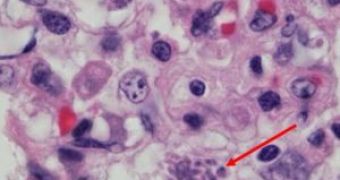Toxoplasmosis is an infection provoked by a common parasite protozoa named Toxoplasma gondii (photo).
It is transmitted to humans from consumption of raw or undercooked meat of an intermediate host (like sheep and rabbit) and aliments or water contaminated with parasite eggs from cat feces, which are the only species lodging the parasite during the sexual stage of its life cycle.
20% to 80% of human populations worldwide are infected with Toxoplasma gondii. Initial exposure usually causes only mild flu-like symptoms. After that, the parasite passes down into an inactive cyst stage that stays resident in muscles and other tissues. Latent toxoplasmosis is asymptomatic but is usually a life-long infection, and its presence is proved by the presence of anti-Toxoplasma antibodies in the blood.
If a woman gets infected with Toxoplasma for the first time while she is pregnant, the parasite can travel across the placenta and cause miscarriage and birth defects. Testing for previous exposure to the parasite is standard in many maternity clinics. Even so, a new study showed that pregnant women with latent infections of Toxoplasma are significantly more likely to give birth to boys than women who are Toxoplasma negative.
This is the first study to find a link between a parasitic infection and the sex ratio in humans. Parasitologist Jaroslav Flegr and his team at Charles University in Prague had found evidence that latent infections could correspond with longer pregnancies. Examining the medical records for 1803 births in maternity clinics, between 1996 and 2006, that routinely tested for Toxoplasma antibodies, they discovered a striking difference between infected and uninfected women. The probability of a fetus to be male increased with the levels of anti-Toxoplasma antibodies.
The usual sex ratio (sex proportion) at birth is .51, meaning 51 boys are born for every 49 girls. But in the women who tested positive for antibodies to Toxoplasma, the ratio was .60--which translates to 60 boys for every 40 girls. The highest levels of antibodies against Toxoplamsa were correlated with a sex ratio of .72, equivalent to 72 boys for every 28 girls.
Scientists believe that the latent parasite modulates and suppresses the immune system. The women's immune system in some cases reacts against male embryos, leading to a higher miscarriage rate for boys in early pregnancy.
Experiments made on rats had a similar effect. "The data are preliminary, but intriguing", says parasitologist Joanne Webster of Imperial College London, who has studied the effects of Toxoplasma on rat behavior. "What isn't clear, she says, is the evolutionary advantage that the parasite might get from skewing the sex ratio".
The parasite is already known to affect the behavior of infected rats, prompting them more daring towards cats. Some have speculated even more that infection might account for cultural differences between nations as well, perhaps making some societies more open and risk-taking.
The researchers caution that these observations suggests that toxoplasmosis skews towards the increase in male births, but it did not establish cause and effect.

 14 DAY TRIAL //
14 DAY TRIAL //